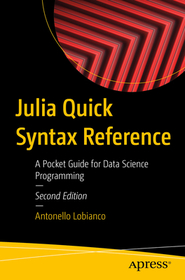
Julia Quick Syntax Reference
A Pocket Guide for Data Science Programming
-
12% KEDVEZMÉNY?
- A kedvezmény csak az 'Értesítés a kedvenc témákról' hírlevelünk címzettjeinek rendeléseire érvényes.
- Kiadói listaár EUR 58.84
-
24 403 Ft (23 241 Ft + 5% áfa)
Az ár azért becsült, mert a rendelés pillanatában nem lehet pontosan tudni, hogy a beérkezéskor milyen lesz a forint árfolyama az adott termék eredeti devizájához képest. Ha a forint romlana, kissé többet, ha javulna, kissé kevesebbet kell majd fizetnie.
- Kedvezmény(ek) 12% (cc. 2 928 Ft off)
- Kedvezményes ár 21 475 Ft (20 452 Ft + 5% áfa)
Iratkozzon fel most és részesüljön kedvezőbb árainkból!
Feliratkozom
24 403 Ft

Beszerezhetőség
Megrendelésre a kiadó utánnyomja a könyvet. Rendelhető, de a szokásosnál kicsit lassabban érkezik meg.
Why don't you give exact delivery time?
A beszerzés időigényét az eddigi tapasztalatokra alapozva adjuk meg. Azért becsült, mert a terméket külföldről hozzuk be, így a kiadó kiszolgálásának pillanatnyi gyorsaságától is függ. A megadottnál gyorsabb és lassabb szállítás is elképzelhető, de mindent megteszünk, hogy Ön a lehető leghamarabb jusson hozzá a termékhez.
A termék adatai:
- Kiadás sorszáma 2
- Kiadó Apress
- Megjelenés dátuma 2025. január 4.
- Kötetek száma 1 pieces, Book
- ISBN 9798868809644
- Kötéstípus Puhakötés
- Terjedelem361 oldal
- Méret 235x155 mm
- Nyelv angol
- Illusztrációk XV, 361 p. 83 illus. Illustrations, black & white 626
Kategóriák
Hosszú leírás:
Learn the Julia programming language as quickly as possible. This book is a must-have reference guide that presents the essential Julia syntax in a well-organized format, updated with the latest features of Julia’s APIs, libraries, and packages.
This book provides an introduction that reveals basic Julia structures and syntax; discusses data types, control flow, functions, input/output, exceptions, metaprogramming, performance, and more. Additionally, you'll learn to interface Julia with other programming languages such as R for statistics or Python. At a more applied level, you will learn how to use Julia packages for data analysis, numerical optimization, symbolic computation, and machine learning, and how to present your results in dynamic documents.
The Second Edition delves deeper into modules, environments, and parallelism in Julia. It covers random numbers, reproducibility in stochastic computations, and adds a section on probabilistic analysis. Finally, it provides forward-thinking introductions to AI and machine learning workflows using BetaML, including regression, classification, clustering, and more, with practical exercises and solutions for self-learners.
What You Will Learn
- Work with Julia types and the different containers for rapid development
- Use vectorized, classical loop-based code, logical operators, and blocks
- Explore Julia functions: arguments, return values, polymorphism, parameters, anonymous functions, and broadcasts
- Build custom structures in Julia
- Use C/C++, Python or R libraries in Julia and embed Julia in other code.
- Optimize performance with GPU programming, profiling and more.
- Manage, prepare, analyse and visualise your data with DataFrames and Plots
- Implement complete ML workflows with BetaML, from data coding to model evaluation, and more.
Who This Book Is For
Experienced programmers who are new to Julia, as well as data scientists who want to improve their analysis or try out machine learning algorithms with Julia.
Több
Tartalomjegyzék:
Part 1. Language Core.- 1. Getting Started.- 2. Data Types and Structures.- 3. Control Flow and Functions.- 4. Custom Types.- E1: Shelling Segregation Model - 5. Input – Output.- 6. Metaprogramming and Macros.- 7. Interfacing Julia with Other Languages.- 8. Efficiently Write Efficient Code. - 9 Parallel Computing in Julia - Part 2. Packages Ecosystem.- 10. Working with Data.- 11. Scientific Libraries.- E2: Fitting a forest growth model - 12 – AI with Julia – E3. Predict house values - 13. Utilities. Appendix: Solutions to the exercises.
Több




